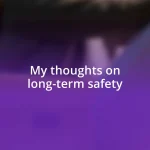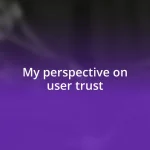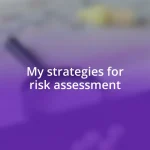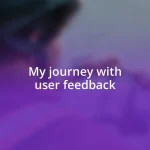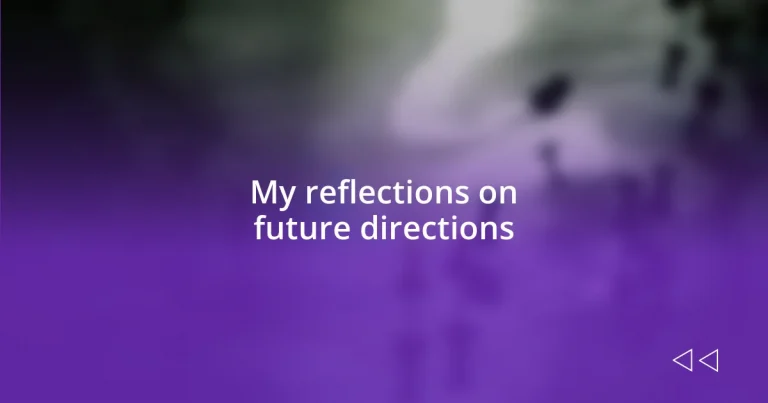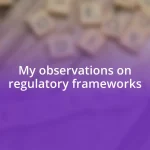Key takeaways:
- Understanding the importance of adaptability and openness to unexpected opportunities can lead to personal growth and transformative experiences.
- Key trends such as sustainability, digital transformation, and remote work are reshaping industries, requiring professionals to embrace them for future success.
- Emphasizing emotional resilience and flexibility in preparation for unforeseen challenges fosters a collaborative and innovative team environment.
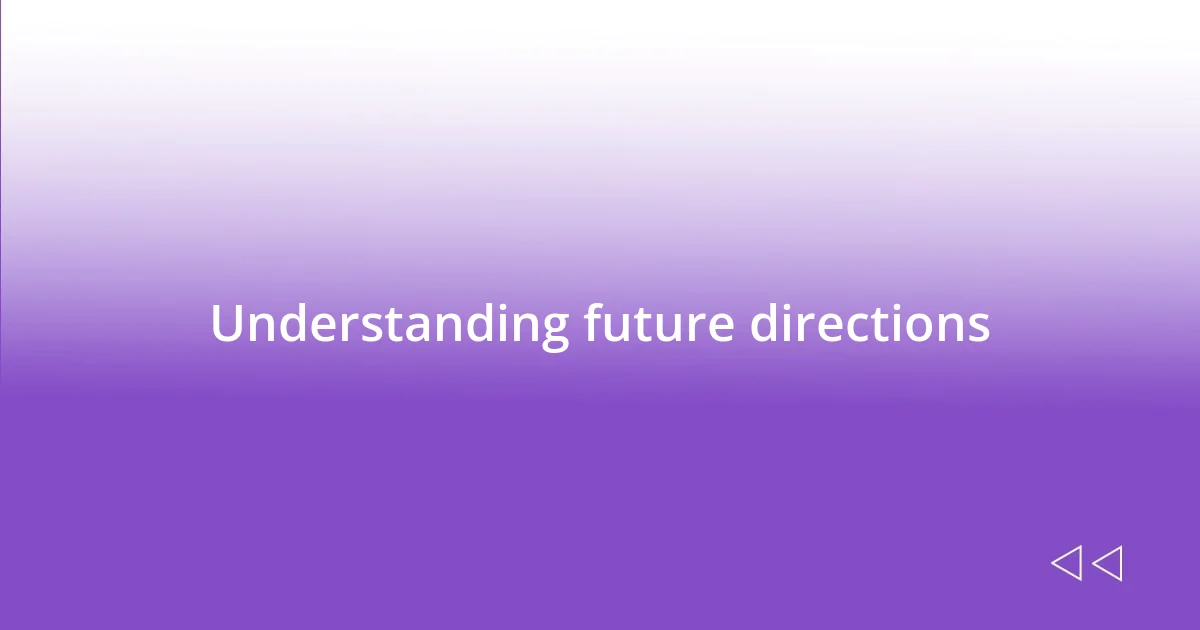
Understanding future directions
Understanding future directions often requires a blend of vision and adaptability. I remember a time when I faced a major shift in my career. The uncertainty was daunting, but it pushed me to embrace change actively rather than resist it. Have you ever found yourself in a similar position? It’s in those moments that we gain insight into what truly drives us.
As I reflect on the future, I realize it’s not just about setting goals; it’s about being open to unexpected paths. I once attended a workshop that completely changed my perspective on success. What initially felt like a detour turned out to be a transformative experience that led me to new passions. How often do we overlook opportunities simply because they don’t fit into our preconceived plans?
Navigating the future can feel overwhelming, but developing a mindset that welcomes growth can simplify the journey. I often ask myself, “What if this challenge is the gateway to my next big breakthrough?” This question has changed my approach countless times. Embracing uncertainty and viewing it as a catalyst for progress can unlock possibilities we never imagined.
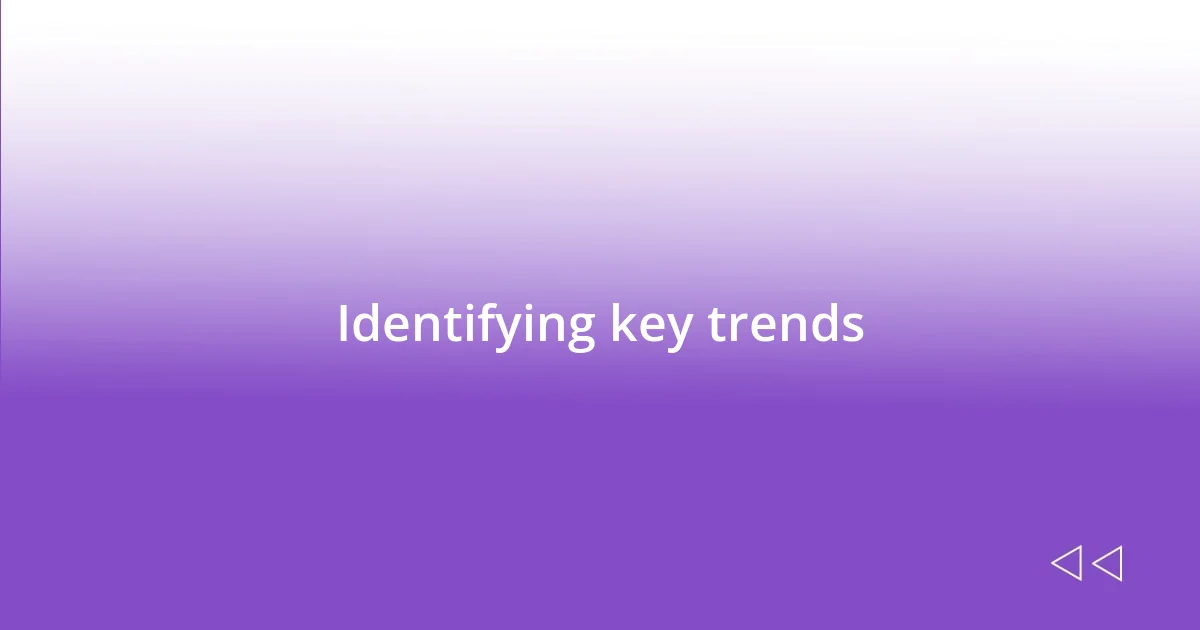
Identifying key trends
Identifying key trends is crucial for navigating the future effectively. Recently, I noticed a growing emphasis on sustainable practices across various industries. It struck me during a community meeting where local businesses discussed shifting towards eco-friendly products; they recognized that aligning with sustainability not only attracts customers but also fosters a sense of shared responsibility. Have you seen similar trends in your area?
As I explored this further, it became clear that digital transformation is another fundamental trend reshaping our professional landscape. I vividly recall my surprise when a colleague introduced me to automation tools that drastically improved productivity in our team. This shift wasn’t just about technology; it opened doors for creative collaboration, breaking down silos that previously existed. Just think about how embracing digital innovations can redefine how we work and connect.
Lastly, the rise of remote work stands out as a defining trend affecting both employees and businesses. I was skeptical about telecommuting at first, fearing it might hinder team dynamics. However, my experience taught me otherwise—my newfound flexibility led to an increase in job satisfaction and work-life balance. Watching companies adapt and thrive in this environment made me realize the importance of flexibility in our future endeavors.
| Trend | Description |
|---|---|
| Sustainability | Increasing focus on eco-friendly practices in business. |
| Digital Transformation | Emphasis on using technology to enhance productivity. |
| Remote Work | Shift towards flexible work arrangements for better work-life balance. |
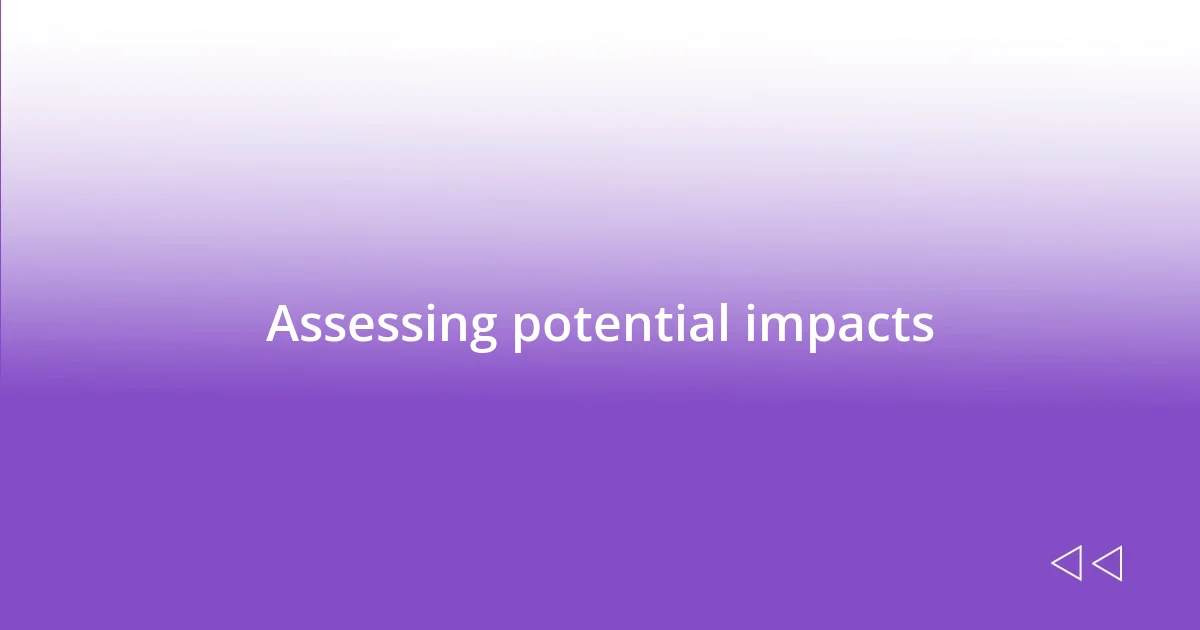
Assessing potential impacts
Assessing the potential impacts of future trends requires a keen awareness of how decisions ripple through our lives and the wider community. I recall a pivotal moment in my career when I opted to invest in training for a new software. Initially, it felt daunting, but shortly after, I realized how this upgrade not only enhanced my skills but also sparked innovation within my team. Recognizing that our choices can either constrict or expand our horizons is critical for future success.
- Emotional Resilience: Navigating change often demands a robust mindset. Embracing setbacks can lead to surprising advancements.
- Community Influence: Personal choices resonate beyond the individual; they can inspire collective growth and transformation.
- Skill Adaptation: The ability to learn and adapt enhances both personal and professional trajectories, fostering continual improvement.
Reflecting on these assessments, I feel the urge to challenge my biases; often, opportunities disguised as challenges can lead to unforeseen benefits. It’s worth pondering how our perceptions shape the impact of our actions in ways we might not initially anticipate.
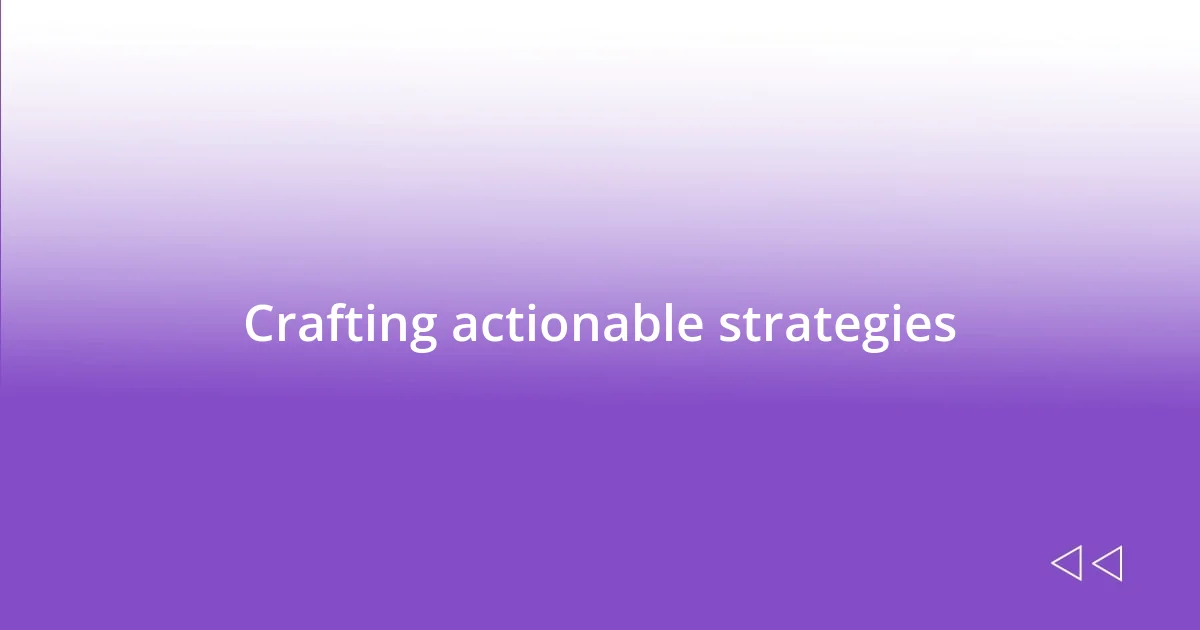
Crafting actionable strategies
Crafting actionable strategies is all about translating insights into tangible steps that drive progress. For instance, in my previous role, we faced a challenge when launching a new initiative. I encouraged my team to break down our goals into small, manageable tasks, and to assign clear responsibilities. This approach not only clarified our path forward but also empowered each individual to contribute meaningfully. Have you ever experienced the power of clearly defined roles in a project?
I also believe in the importance of regular progress reviews. Early in my career, I overlooked this aspect, and projects often veered off course. However, implementing bi-weekly check-ins transformed our workflow; we could identify obstacles quickly and recalibrate as needed. This practice nurtured accountability, making the entire team feel invested in our collective success. Can you recall a time when consistent feedback helped steer a project in the right direction?
Another key strategy is embracing collaboration. When I partnered with colleagues from different departments on a cross-functional project, I was amazed by the fresh perspectives they brought. This collaboration sparked innovative ideas we had never considered. As a result, we achieved outcomes that exceeded our original expectations. How has working with diverse teams influenced your thinking and problem-solving skills?
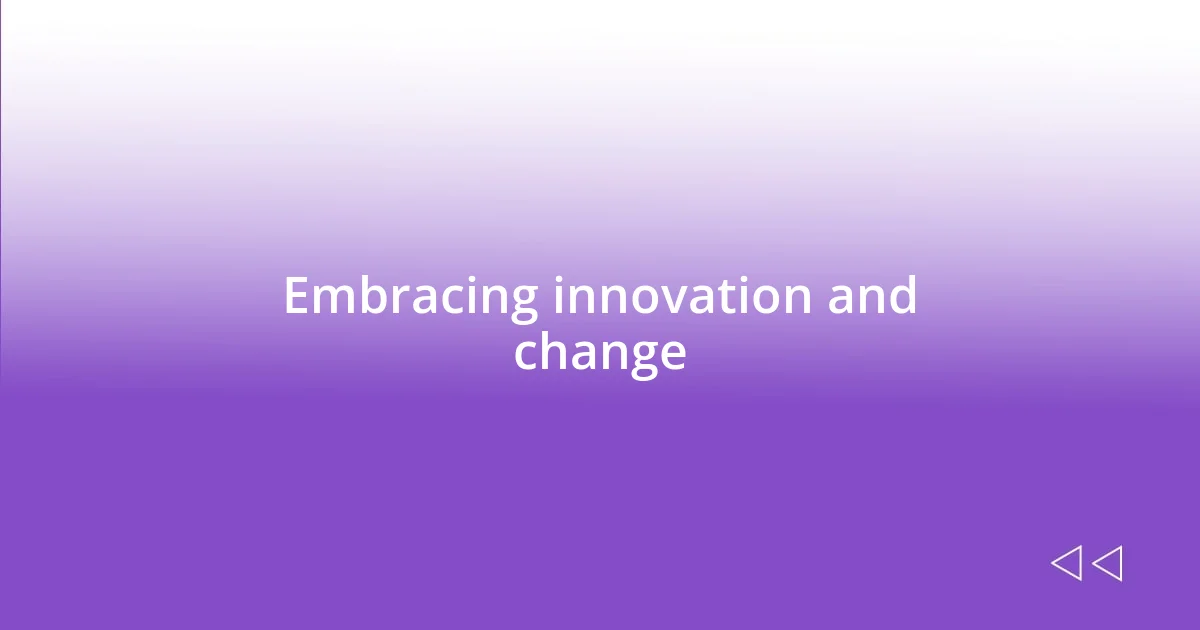
Embracing innovation and change
Embracing innovation and change is about shifting our mindset toward growth. I recall the moment I decided to adopt a new approach to problem-solving in my work. At first, it felt uncomfortable, almost like stepping out of a cozy blanket into the cold. But this discomfort fostered a creative mindset within me, allowing for fresh ideas to flow in and transforming obstacles into opportunities. Can you relate to those moments where taking a chance opened up new possibilities?
Being open to change doesn’t just benefit us individually—it also enhances our team dynamics. During a project where we incorporated new technologies, I noticed how our collective enthusiasm fueled creativity. Initially, I was skeptical about how my team would adapt, but their willingness to experiment led to solutions that revolutionized our workflow. I often ask myself: What if we approached every change with curiosity and excitement instead of fear?
The emotional resilience needed to navigate these transitions is essential. There was a time when a major shift in our company’s direction made many uneasy, including myself. As I learned to embrace the uncertainty, I found strength in vulnerability, discovering a deeper connection with my colleagues. It taught me that change is often messy but can lead to profound growth. Have you experienced a time when vulnerability in the face of change brought unexpected connections?
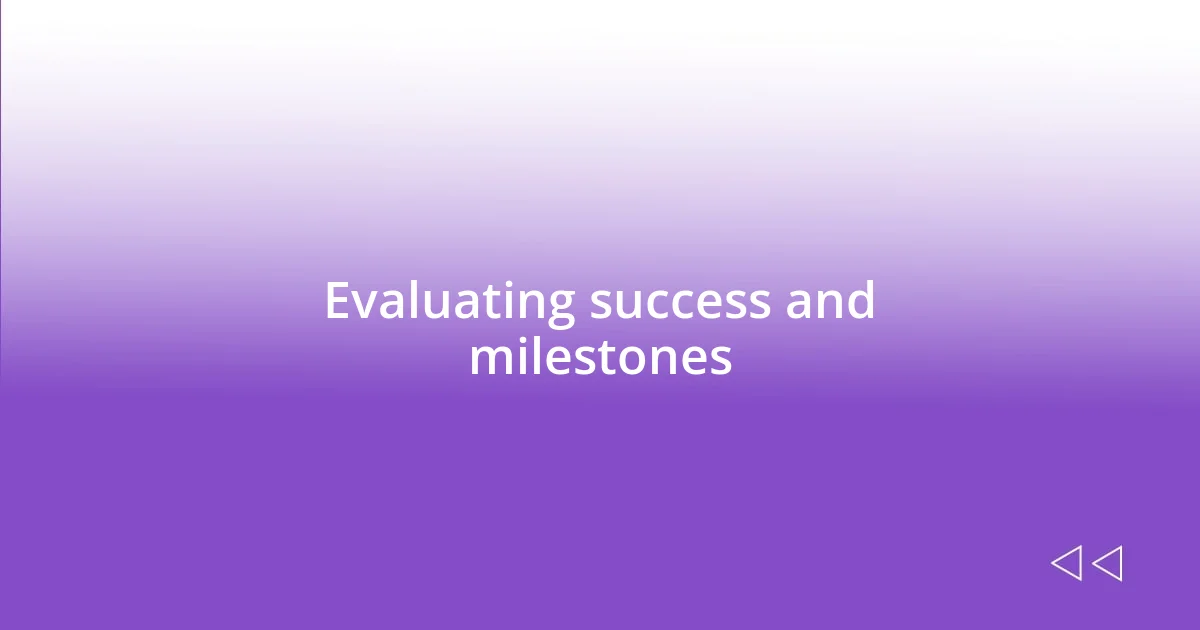
Evaluating success and milestones
Evaluating success and milestones is a crucial part of any journey. I remember a specific project where we set concrete milestones to measure our progress. Each time we hit a milestone, it felt like a mini-celebration, reinforcing our commitment and motivating the team to push harder. Have you ever noticed how acknowledging small wins can shift team morale in a positive direction?
There were moments when we experienced setbacks, too. Reflecting on these challenges taught me the value of adaptive evaluation. During one campaign, despite initially missing our target, a candid analysis revealed we had successfully engaged an audience we had previously overlooked. This pivotal realization shifted our focus and ultimately led to a greater impact than we had anticipated. Who would have thought that a perceived failure could uncork new possibilities?
In my experience, creating a framework for evaluating success goes beyond just numbers. It involves understanding the emotional journey of the team. I once facilitated a session where we shared our individual achievements and struggles openly. The vulnerability in that room ignited a new sense of unity and purpose among us. Have you ever participated in a moment of shared reflection that deepened your connection with your team?
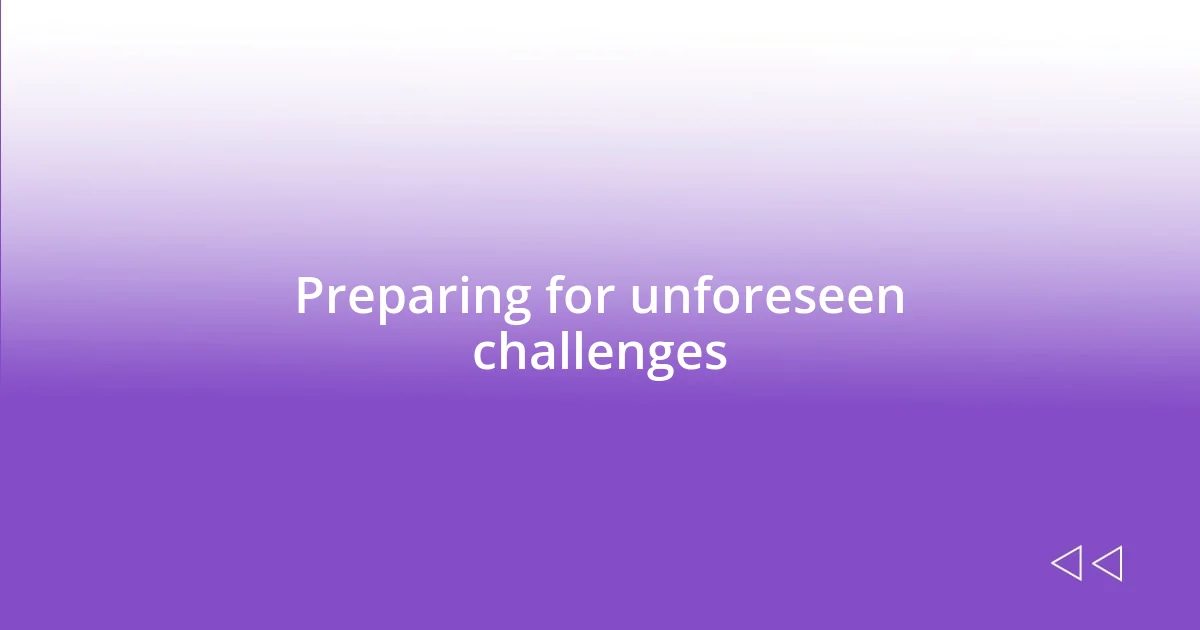
Preparing for unforeseen challenges
The unexpected is always lurking around the corner, and I’ve faced my fair share of surprises. I distinctly remember a project timeline being thrown off course when a key resource became unavailable. It felt overwhelming at first, but it taught me the importance of having contingency plans. What if we always had backup options in our plans? Our framework would not just be proactive, but also resilient.
Adapting to unforeseen challenges isn’t just about tactics; it’s deeply emotional. There was a time when our team faced a sudden market shift that left us scrambling. Instead of panicking, we gathered to discuss our fears and thoughts. Sharing our collective anxiety created a bond that strengthened us. Have you ever noticed how vulnerability can transform fear into a sense of camaraderie?
Being prepared for the unknown also means cultivating a mindset that welcomes flexibility. I often remind myself that our best laid plans might require adjustment, and that’s completely okay. I recall an instance when we shifted the approach midway through a campaign. This decision, born out of necessity, unexpectedly led us to a more impactful strategy. Could it be that adaptability might just lead to our greatest breakthroughs?



